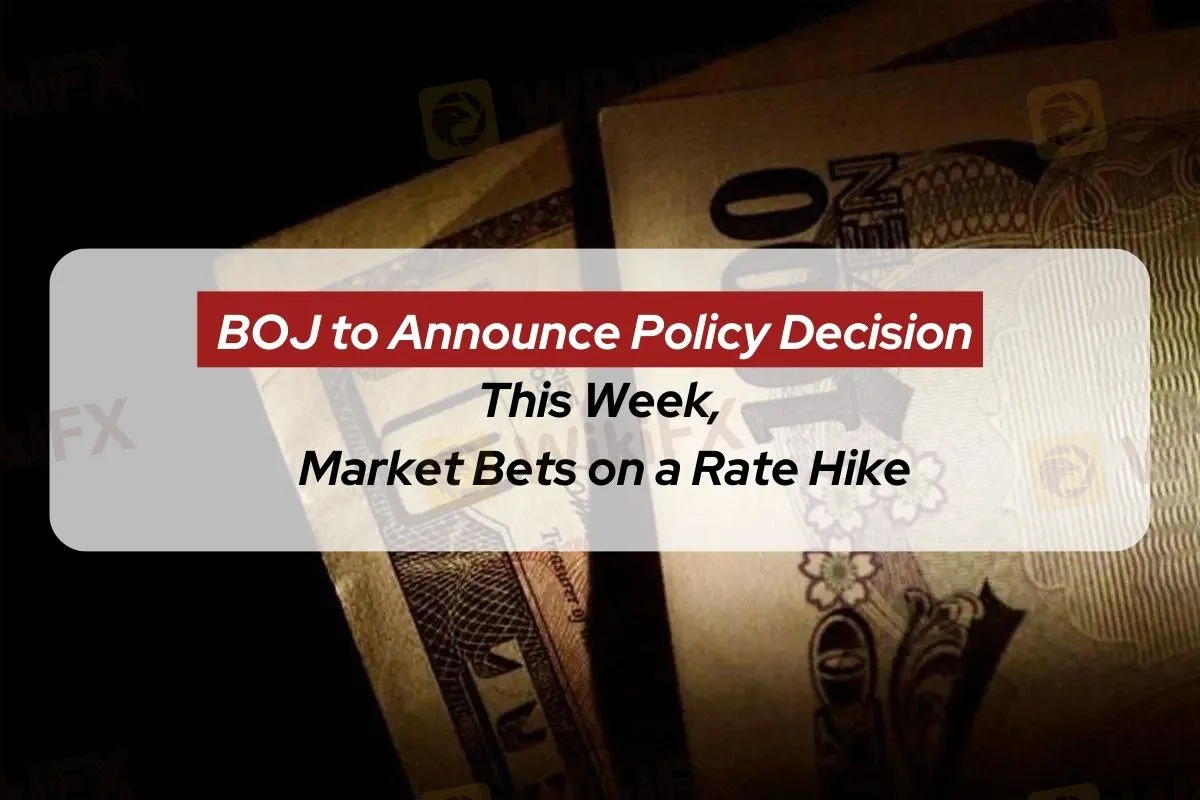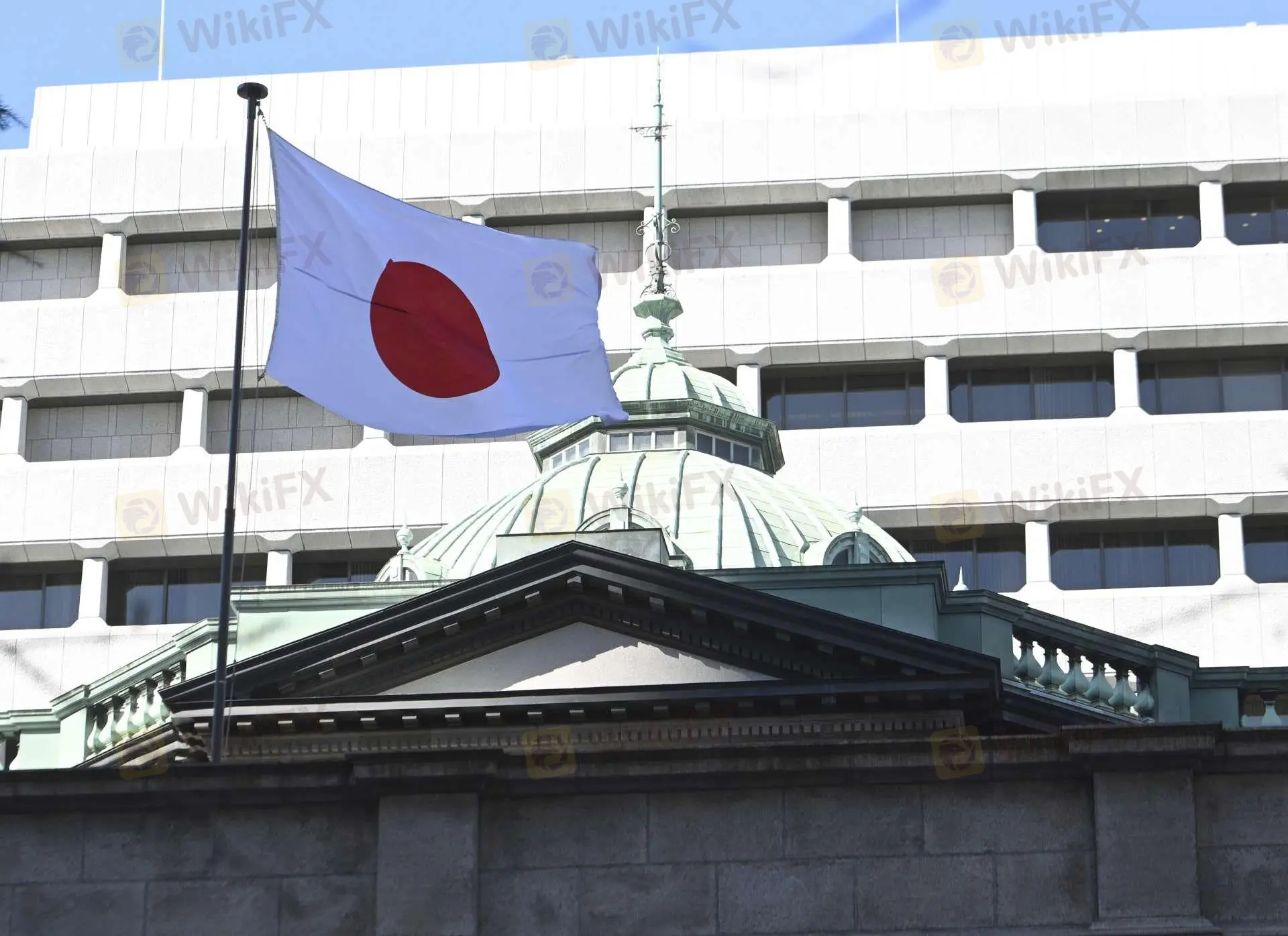简体中文
繁體中文
English
Pусский
日本語
ภาษาไทย
Tiếng Việt
Bahasa Indonesia
Español
हिन्दी
Filippiiniläinen
Français
Deutsch
Português
Türkçe
한국어
العربية
BOJ to Announce Policy Decision This Week, Market Bets on a Rate Hike
Abstract:The yen strengthens past 156 as markets anticipate a rate hike from the Bank of Japan this week.

Yen Strengthens Beyond 156 as Market Expects a Rate Hike
On January 24, the Bank of Japan (BOJ) will announce its latest policy decision, followed by a press conference by Governor Kazuo Ueda. Recent surveys indicate a near-unanimous market expectation of a rate hike this week. Overnight index swaps (OIS) pricing suggests a 99% probability of a hike, reflecting strong investor anticipation of tighter monetary policy. According to Bloomberg‘s latest survey, about 74% of economists expect the BOJ to raise rates by 25 basis points at this meeting, up from 52% in the previous survey. This strong expectation has been partially reflected in the yen’s performance over recent weeks, with the currency surging beyond the 156 level against the US dollar, hitting a recent high.

Nomura Securities suggests that the BOJ‘s rate hike will serve as a key driver for yen appreciation, especially as global central banks broadly tighten monetary policy. Following this hike, the BOJ may adopt a more flexible policy trajectory, further solidifying the yen’s position in global markets.
Wage Growth and Persistent Inflation Support Tightening Measures
The BOJ‘s latest regional economic report highlights structural labor shortages driving companies to raise wages. Many firms anticipate continuing wage hikes into 2025, providing strong support for the BOJ’s tightening policy. Meanwhile, domestic inflationary pressures remain evident. Data shows that Japan‘s core consumer price index (CPI) rose 2.7% year-on-year in November 2024, marking 39 consecutive months of growth. Notably, Tokyo’s December CPI growth accelerated to 3.0% year-on-year from 2.6% in November, with the month-on-month growth rising from 0.4% to 0.5%, indicating persistent price pressures.

Historically, wage growth and price increases in Japan have been closely linked. As spring labor negotiations approach, the expectation of wage hikes could further strengthen economic activity and continue to support inflation. These data points provide a solid foundation for the BOJ‘s tightening policy, reinforcing market bets on this week’s rate hike.
Key Hurdle: Global Market Volatility
While the market has high expectations for a BOJ rate hike this week, external market volatility could pose a potential obstacle. Uncertainty in international markets, particularly regarding possible U.S. economic and trade policies, could significantly influence the BOJs policy decisions. Reuters analysis suggests that if U.S. policy changes trigger significant market swings, the BOJ might reconsider the timing of a rate hike.

Additionally, BOJ Deputy Governor Ryozo Himino recently emphasized the importance of timing in monetary policy implementation, as it is critical for economic stability. He further stated that the board would base its discussions on Japans economic fundamentals while considering global market dynamics before making a final decision.
Should the BOJ hike rates as expected, the yen could strengthen further against the U.S. dollar and other major currencies. Analysts predict that yen appreciation will have a dual impact on Japans economy. On one hand, a stronger yen may weaken the competitiveness of export-driven industries, particularly in the automotive and electronics sectors. On the other hand, a strong yen could reduce the cost of imported energy and raw materials, potentially mitigating inflationary pressures.
Disclaimer:
The views in this article only represent the author's personal views, and do not constitute investment advice on this platform. This platform does not guarantee the accuracy, completeness and timeliness of the information in the article, and will not be liable for any loss caused by the use of or reliance on the information in the article.
Read more

How to Become a Profitable Forex Trader in Pakistan in 2025
If you want to enter the forex market in Pakistan and achieve success, earning consistent profits and excelling in trading, then you should check out this “How to Become a Profitable Forex Trader in Pakistan in 2025” article. You will wonder why you need to do this? The answer is simple: this article covers all the essential topics such as Forex Trading in Pakistan, and ways to learn Forex Trading in Pakistan, even if you are a native speaker and want to learn forex trading in Urdu. This article talks about that too. So, if you want to succeed in the forex market in 2025, read this article sincerely.

Alpha FX Allegations: Traders Claim Account Blocks, Withdrawal Denials and Security Breaches
Is trading with Alpha FX fraught with too many errors and scams? Have you seen your forex trading account blocked after requesting fund withdrawals with the broker? Invested a heavy amount, but finding it hard to withdraw the sum? Have you seen domain changes while attempting an Alpha FX login? These issues have become typical for Alpha FX traders, with many of them sharing their frustration online. In this Alpha FX review guide, we have shared some trading complaints against the UK-based forex broker. Read on!

In-Depth Review of MH Markets Trading Conditions and Leverage – An Analysis for Experienced Traders
For experienced traders, selecting a broker is a meticulous process that extends far beyond marketing claims and bonus offers. It involves a granular analysis of the core trading environment: the quality of execution, the flexibility of leverage, the integrity of the regulatory framework, and the suitability of the conditions for one's specific strategy. MH Markets, a broker with a 5-10 year operational history, presents a complex and multifaceted profile that warrants such a detailed examination. This in-depth review dissects the MH Markets trading conditions and leverage, using primary data from the global broker inquiry app, WikiFX, to provide a clear, data-driven perspective. We will analyze the broker's execution environment, account structures, and regulatory standing to determine which types of traders might find its offering compelling and what critical risks they must consider.

MH Markets Commission Fees and Spreads Analysis: A Data-Driven Breakdown for Traders
For any experienced trader, the long-term viability of a brokerage partner hinges on a delicate balance of trust, execution quality, and, critically, cost. Trading fees, both direct and indirect, can significantly erode profitability over time. This makes a granular understanding of a broker's cost structure not just beneficial, but essential. This in-depth analysis focuses on MH Markets, breaking down its commission fees, spreads, and other associated costs to provide a clear, data-driven perspective for traders evaluating this broker for their long-term strategies. Drawing primarily on verified data from the global broker inquiry platform WikiFX, alongside other public information, we will dissect the MH Markets spreads commissions cost structure. We aim to move beyond marketing claims and uncover the practical, real-world costs of trading with this broker, helping you determine if its pricing model aligns with your trading style and financial goals.
WikiFX Broker
Latest News
GCash Rolls Out Virtual US Account to Cut Forex Fees for Filipinos
WikiFX's New Evaluation of ATM Capital LTD: Does its License Protect the Arab Investor?
How a Fake Moomoo Ad Led to the “New Dream Voyage 5” Scam
Is Axi Legit? A Data-Driven Analysis of Its Regulatory Standing and Trader Feedback
Trive Investigation: High Score, Hidden Risk - The Profit Paradox
In-Depth Uniglobe Markets Commission Fees and Spreads Analysis – What Traders Should Really Know
FXPesa Review: Are Traders Facing High Slippage, Fund Losses & Withdrawal Denials?
CMC Markets Australia Revenue Surges 34%, But High-Net-Worth Clients Face Tax Phishing Threat
The 350 Per Cent Promise That Cost Her RM604,000
INZO Commission Fees and Spreads Breakdown: A 2025 Data-Driven Analysis for Traders
Currency Calculator



